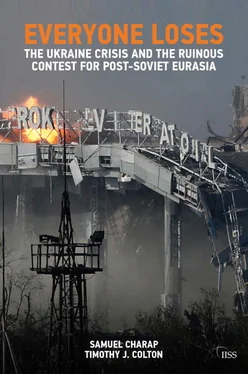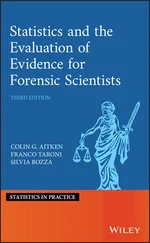In government-controlled areas of the east and south, popular turnout in the 2014 parliamentary election was significantly lower than in the west and centre. This helped produce a parliament with a large declaratively pro-Western majority and inclined some to the conclusion that Ukrainians themselves had profoundly changed their views. It turns out that the quantity of votes cast for such parties was approximately the same as it had been for all previous elections; what had changed was the total number of votes due to low turnout in the south and east. [21] Calculations by Keith Darden, Associate Professor, School of International Service, American University, shared with the authors.
The presence of armed far-right volunteer battalions and their televised public humiliation of candidates who had been members of the Party of Regions (some of them dumped unceremoniously into rubbish bins in front of TV cameras) cultivated a climate of fear. [22] On the rubbish bins, see Roland Oliphant, ‘Up to a Dozen Ukraine Officials Dumped in Wheelie Bins’, Telegraph , 7 October 2014, http://www.telegraph.co.uk/news/worldnews/europe/ukraine/11145381/Up-to-a-dozen-Ukraine-officials-dumped-in-wheelie-bins.html .
Several prominent figures associated with the party were murdered in 2015, including an outspoken pro-Russian journalist.
At the time of writing, far-right nationalist figures serve as speaker of the Rada (and thus first in the presidential line of succession) and in senior positions in the interior ministry. The historian who directs the official Institute for National Memory is a nationalist ideologue; he was the author of a ‘de-communisation’ law that has led to the renaming of thousands of streets, towns, villages and even major cities. Implementation has maximised the law’s divisiveness. For example, Moscow Avenue in Kyiv has been renamed Stepan Bandera Avenue in honour of the mid-twentieth-century Ukrainian nationalist who allied with the Nazis against the Red Army. Bandera’s name is anathema to millions of Ukrainians, particularly in the south and east of the country, and to many Poles and Jews who associate him with wartime atrocities committed by nationalist groups.
Beyond the empowering of ethno-nationalists, Ukrainians on both sides of the line of contact make a habit of dehumanising one another. To many rebels, the government in Kyiv is a ‘fascist junta’ and all of its supporters ‘Banderites’. In Kyiv, as one Western journalist observed in 2014, empathy has also been notable by its absence:
Imagine that all the people who opposed your politics for twenty years – all the most backward, poorest, least successful people in the country – got together in one place, declared an independent republic, and took up arms ?… All the enemies of progress in one place, all the losers and has-beens: wouldn’t it be better just to solve the problem once and for all? Wouldn’t it be a better long-term solution just to kill as many as you could and scare the shit out of the rest of them, forever? This is what I heard from respectable people in Kiev. Not from the nationalists, but from liberals, from professionals and journalists. All the bad people were in one place – why not kill them all? [23] Keith Gessen, ‘Why Not Kill Them All?’, London Review of Books , vol. 36, no. 17, 11 September 2014.
Such sentiments are stoked by political leaders, including Poroshenko, who in one statement compared the rebel territories with Mordor, the seat of evil in J.R.R. Tolkien’s fantasy novels. [24] ‘Ukraine’s Poroshenko: “New Russia” Is like “Mordor”’, BBC News, 24 August 2015, http://www.bbc.com/news/world-europe-34037743 .
The Ukraine crisis has had a major impact on Russia as well. An economic downturn that began in 2014 has been the longest in its post-Soviet history. [25] GDP growth was negative for at least six consecutive quarters from Q3 2014 to Q4 2015. (2016 quarter-on-quarter data is unavailable at the time of writing.) During the 1998 crisis, there were three negative quarters, and four in the global financial crisis of 2008–09.
After only 0.7% growth in 2014, and a 3.7% drop in 2015, the Russian economy is forecast to contract by 1.2% in 2016. Households have been hit hard; in 2015, real wages decreased by 9.5%. [26] See World Bank, ‘Global Economic Prospects: Divergences and Risks’, June 2016, p. 4, http://pubdocs.worldbank.org/en/842861463605615468/Global-Economic-Prospects-June-2016-Divergences-and-risks.pdf .
In late 2016 the rouble’s exchange rate with the dollar was half what it was in January 2014.
Russia’s economic miseries can be traced back to Putin’s avoidance of structural reform and the threefold collapse of oil prices in 2014–15. The role of the Ukraine crisis at the margin is thus hard to quantify. One econometric study suggests that Western sanctions cost an average of 2% in quarter-on-quarter drop in GDP between mid-2014 and mid-2015. [27] Konstantin Kholodilin and Aleksei Netšunajev, ‘Crimea and Punishment: The Impact of Sanctions on Russian and European Economies’, Discussion Papers, German Institute for Economic Research, 2016, https://www.diw.de/documents/publikationen/73/diw_01.c.530645.de/dp1569.pdf . See also Christian Dreger et al., ‘The Ruble between the Hammer and the Anvil: Oil Prices and Economic Sanctions’, Discussion Papers, German Institute for Economic Research, 2015, https://www.diw.de/documents/publikationen/73/diw_01.c.507887.de/dp1488.pdf .
But the indirect and long-term consequences of the sanctions and the conflict dwarf these direct, short-term ones. [28] See World Bank, ‘The Dawn of a New Economic Era?’, Russia Economic Report, April 2015, pp. 33–42, https://www.worldbank.org/content/dam/Worldbank/document/eca/russia/rer33-eng.pdf .
Examples include an increase in capital flight that hit the Russian economy’s pre-existing weak spot, anaemic levels of investment – the primary threat to long-term growth prospects. Net capital outflows reached approximately 8% of GDP in 2014, before dropping to 3% of GDP in 2015, a relatively normal level for Russia, but still a near-insurmountable challenge to long-term growth. The effective closure of international capital markets to Russian governmental debt prevented the kind of pump-priming used in 2008–09 to stave off a deeper recession. It also forced the authorities to tap reserve funds established during the years of bullish oil prices in order to cover budget shortfalls. The Russian government’s long-standing ambition to modernise and diversify the economy away from oil and gas will now be much more difficult to realise because technology transfer from the West via direct investment, co-production and trade has been curtailed. Even if the sanctions are lifted, reputational and political risk will restrain Western firms from returning to the Russian market at pre-crisis levels.
The influence of the Ukraine crisis on Russian domestic politics is every bit as noteworthy. As of the winter of 2013–14, pluralism and democratic institutions were at their lowest ebb since the Soviet collapse. The Maidan Revolution, the annexation of Crimea and the war in the Donbas made a bad situation much worse. The crisis galvanised domestic support for President Putin, sending his approval rating above 80% in March 2014, and keeping it there for 31 months at the time of writing. [29] Polling conducted by the Levada Center, http://www.levada.ru/eng/indexes-0 .
The Western sanctions, rather than turning Russians against their rulers, educed a defensive reaction, creating the perception of an external threat that the government leveraged to boost popular support. [30] See Mikhail Dmitriev, ‘Between the Crimea and the Crisis: Attitude Change of Russians and Its Political Implications’, Presentation, Center for Strategic and International Studies, 28 April 2015, pp. 16–26, https://csis-prod.s3.amazonaws.com/s3fs-public/legacy_files/files/attachments/150428_Dmitriev.pdf .
The country’s war footing marginalised what remained by way of dissenting voices, since opposition to government policy became akin to treason.
Читать дальше











